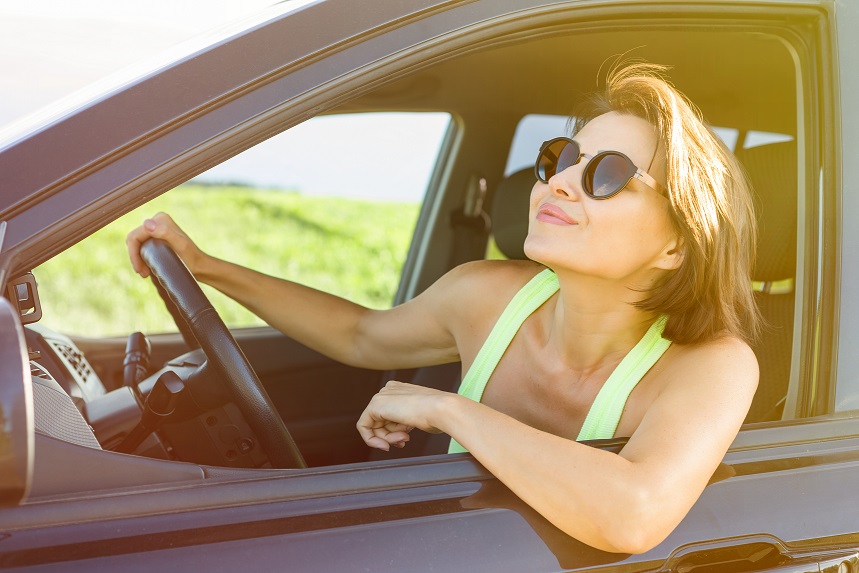From taking hay fever medication to driving with (or without) sunglasses, some of the most common driving offences in summer are the ones most drivers don’t even realise are illegal.
Whilst most British drivers expect hailstorms, strong winds or what feels like torrential rain, the last thing anyone could have expected for summer 2022 was for temperatures to reach record highs.
The UK has endured its first ever red weather warning for exceptional heat. According to the Met Office, temperatures hit high 30s C, and some areas of the country saw temperatures of 40°C.
However, whilst the UK government has urged as many people to stay indoors and keep cool as much as possible, commercial fleet operators will have no choice but to trudge on throughout the heat as the hidden heroes keeping Britain’s supply chain running.
As a result, many drivers find themselves packing their sunglasses in with the rest of their long-haul essentials, but what many drivers may not be aware of is that this could potentially put them at risk of committing a summer driving offence, without even knowing it.
Let’s look at why this is, and what other common summer driving habits are actually against the law.
Driving under the influence of hay fever tablets
Around 10 million people in England alone suffer from hay fever, according to the NHS. For sufferers, this comes with irritating symptoms such as sneezing and watery eyes, which could be a serious danger whilst doing 70mph on a busy road if a driver is rubbing or even shutting their eyes to sneeze.
However, taking a hay fever tablet is not always the safest choice, as some can cause blurred vision and drowsiness. In fact, Rule 96 in the Highway Code states that drivers must not operate a vehicle under the influence of drugs or medicine at all, and this includes for hay fever.
Maximum penalty: 6 months in prison, 3-11 points and an unlimited fine.
Using a contactless payment method at a drive-thru
Technological advancements mean there are now more ways than ever before to pay for goods without physical cash, and for commercial drivers who often find themselves stopping off at motorway services or fast food chains, it’s much more convenient than searching their cab for their wallet.
Mobile apps such as Google or Apple Pay allow drivers to simply scan a device and then collect, but this still counts as using a mobile phone whilst driving in the eyes of the UK law.
Maximum penalty: a driving ban, 3 points and a £1,000 fine.
Not turning on the air conditioning or opening a window
Rule 237 of the Highway Code states that drivers must keep their vehicle well-ventilated to avoid drowsiness. And whilst tired driving isn’t a legal offence in itself, it is a behaviour which can be deemed dangerous if the driver gets overheated, agitated or even suffers heatstroke due to lack of proper ventilation.
Maximum penalty: 2 years in prison, 3-11 points and an unlimited fine.
Wearing the wrong sunglasses
Whilst many drivers would assume that all sunglasses are the same, and all of them offer the same protection from driving glare, this isn’t actually the case.
This is because normal, everyday sunglasses can sometimes be too dark for driving, and some frames also block peripheral vision. According to Specsavers, sunglasses with category 3 lenses are best for summer driving conditions, and recommend that it’s always best to get UV400 protection in sunglasses to be safe.
For this driving offence, the Highway Code states that drivers should pull over if they are ever ‘dazzled by bright sunlight’. Therefore, if a driver isn’t wearing the right sunglasses that prevent them from being dazzled, they could risk being charged with careless driving.
Maximum penalty: a driving ban, 3-9 points and an unlimited fine.
Overloading
Rule 98 of the Highway Code states that vehicles should not be overloaded with a weight that’s greater than the manufacturer’s recommendation. This means that whilst it might seem like a good idea to deliver a load quicker for the customer and leave enough time for a BBQ at home, it could land actually see drivers face penalties for using their vehicle in a dangerous condition.
Maximum penalty: 3 points and a £2,500 fine.
Causing an accident on a wet road
According to the Road Surface Treatments Association (RSTA), asphalt roads have the potential to bleed through to the surface in hot weather after it’s been raining. This reduces skidding resistance, makes road surfaces more slippery and increases the risk of accidents or breakdowns.
It also means that if a driver were to cause an accident whilst driving on a slippery road, they could be charged with dangerous driving.
Maximum penalty: 2 years in prison, a driving ban, 3-11 points and an unlimited fine.
Come rain or shine, we’re here when you need us
Offering a 24/7/365 service across the country from breakdown recovery to specialist assistance, our 55-year heritage at Egertons has led us to be one of the UK’s leading vehicle rescue and recovery operators.
For us, our service starts from the moment you first get in touch with us, with our sophisticated triage process allowing us to deploy the exact right vehicles to a scene first time.
Combine this process with our 300-strong fleet, vast range of equipment available on hand and the technology it is equipped with, you can rest assured you’re in the best of hands.
In other words, you make the call, and we’ll do the rest.


